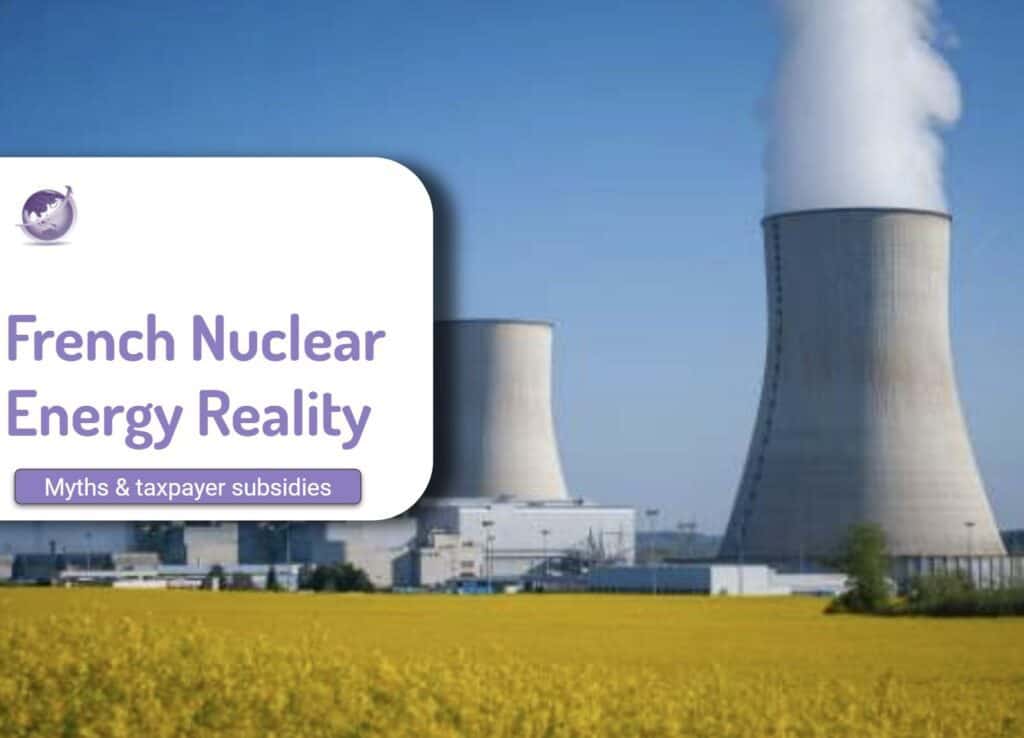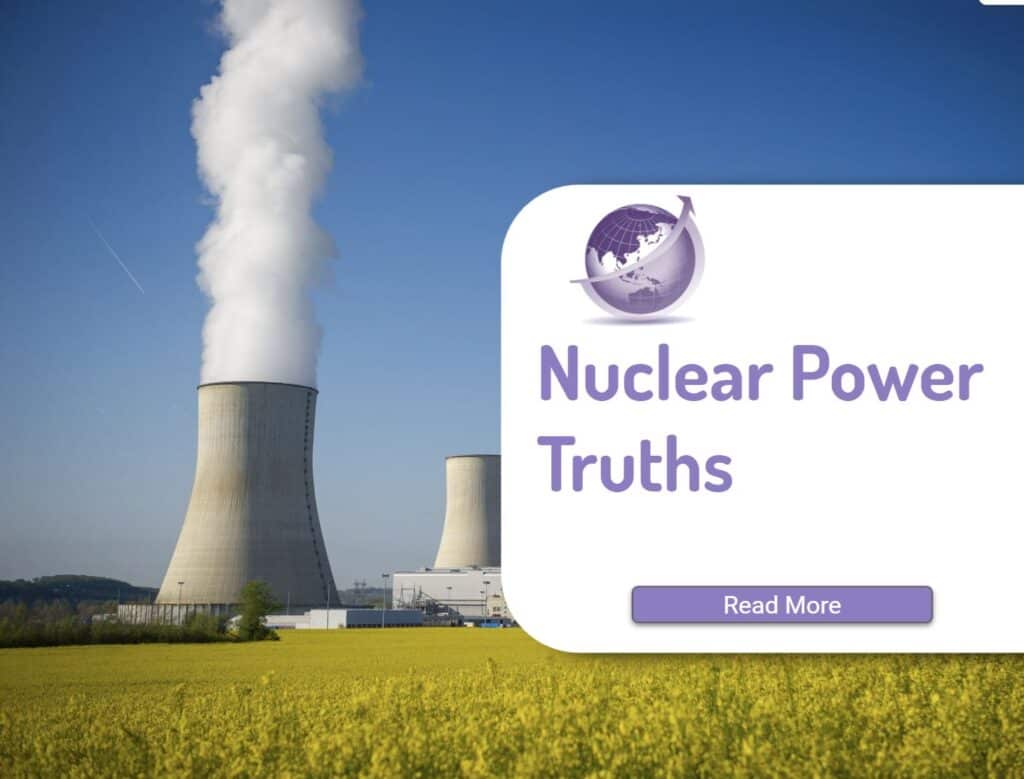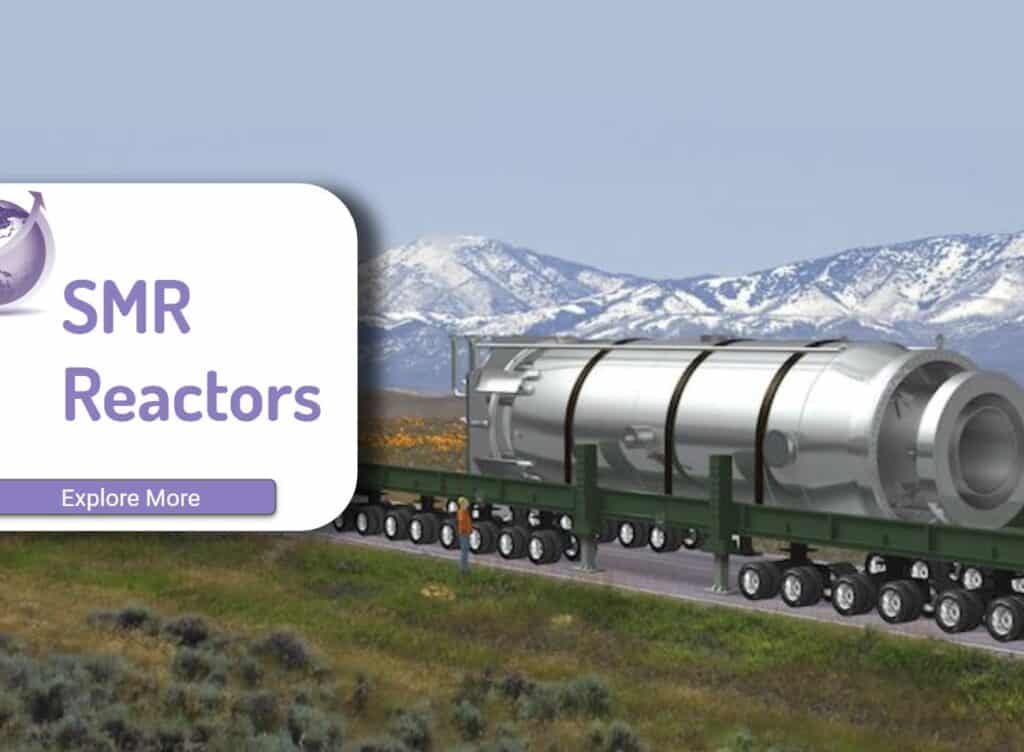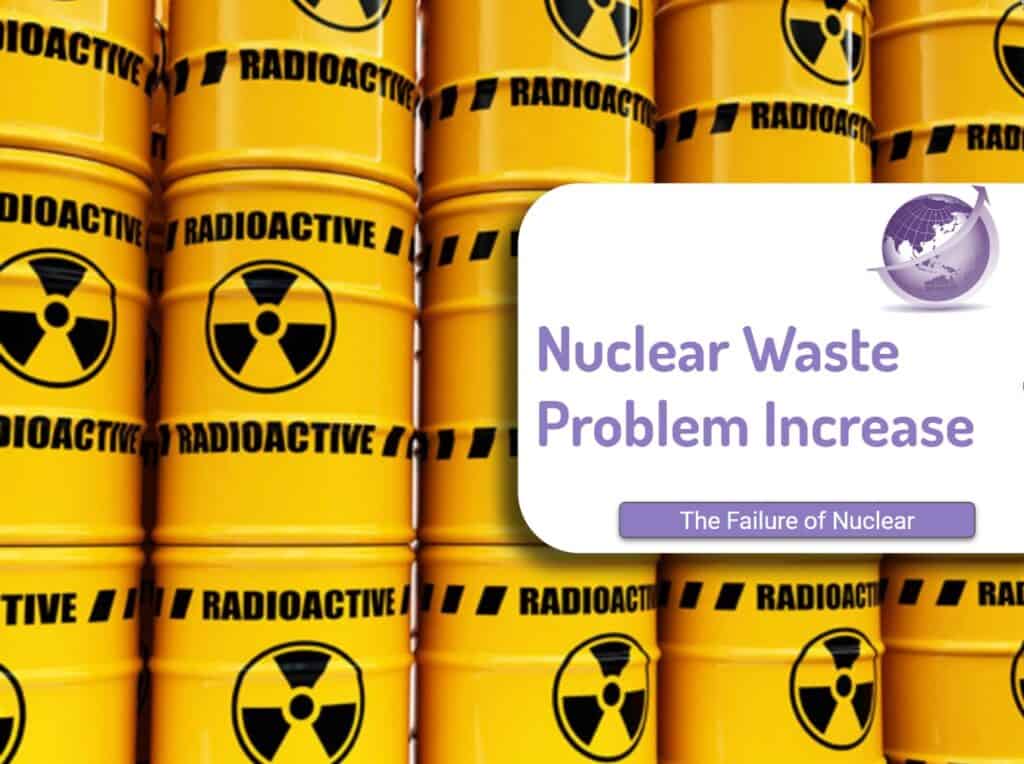France has 56 nuclear reactors out of the 444 nuclear reactors globally, and is often held up as a poster child of the nuclear industry, whereas there is much misinformation about nuclear in France. Is this deliberate and purposeful deception or simply lack of knowledge? (See most recent updates August 2024 for Frances’s plans)
Nuclear power is the largest source of electricity in France, with a generation of 379.5 TWh, or 70.6% of the country’s total electricity production of 537.7 TWh,[1] the highest percentage in the world.[2] Since June of 2020, it has 56 operable reactors totalling 61,370 MWe, one under construction (1630 MWe), and 14 shut down or in decommissioning (5,549 MWe).
Why Did France Go All Out for Nuclear
France went big on 45 nuclear stations during the 1980’s and added another 8 in the 1990s:
- It has no natural fossil fuel resources on its territory
- It needed them for its nuclear weapons.
Status of Nuclear Plants
Every year an independent commission suggests the regulatory electricity price in France, and the answer is the same. The price has to increase to meet the cost of decommissioning the reactors. The answer is the same as the government recoils in horror and says, “Not on my watch.”
Between 1973 and 1998 France shut down 7 reactors. Only one has been dismantled, two are in the process of decommissioning. One of them was shut down in 1985, the other in 1998.
Successive governments have not been enthusiastic about speeding up the process because it means higher electricity prices.
Reliability
Often touted as reliable, the fleet is actually old (many 40 years) and the company has inadequate funds. In April, a report from The Times reported that the operator of France’s electricity grid, Réseau de Transport d’Électricité (RTE), had asked customers to cut consumption as cold weather increases demand at a time when about half the country’s nuclear reactors are offline.
Private Investment Failure
In most other countries, private investment has built fossil fuel plants or more recently renewable energy generation. Private investment runs a mile from nuclear because of the uncertain return on investment and the risk to investors. In France, the EDF (Electricite de France) is the major company for nuclear.
- Nuclear is more than 3 times more expensive than other sources.
- Take too long to build
- Are a high risk investment
- Give low returns on investment
- Vulnerable to a lack of cooling water on the generating side
- Are a terrorist risk (dirty bomb)
- Low social acceptance.
Bloomberg reports the French Government is looking to nationalise debt-laden power company EDF. It holds an 84% stake in the $30bn energy giant. , could retain domestic business but review overseas operations. In Feb 2022, the Government offered $2.4bn to support EDF, as the group sees a hit to profits due to outages at several of its nuclear plants and the impacts of a government power-price cap.
From the most recent balance sheet, EDF had liabilities of €97b falling due within a year, and liabilities of €201b due beyond that. It had cash of €43.4B and €40.9B receivables or net liabilities of €214.7b.
This debt towers over the €30.6b company.
France Government Bails out EDF In May 2022
The French Govt is locked into supporting EDF. In May 2022, they say, “in accordance with its commitment, the French State subscribed for an amount of approximately 2.7 billion euros, representing approximately 83.88% of the Rights Issue and holds approximately 83.88%[1] of the Company’s share capital following the completion of the Rights Issue.”
As a sleight of hand for the French Govn to hand them another subsidy. See this article on the bailout.
New Flamanville Plant
France has a “Hinkley” new plant with major cost and delays.
- Flamanville in Normanby was started in 2007
- Initial completion estimate was 2012. Now EDF expect to load U in 2024.
- Initial estimate of cost was €3.3b. Now €13.2b
Waste Issues
- By 2013 about 370,000 tonnes of spent fuel had been produced
- Less than 120,000 tonnes had been processed.
- That leaves 250,000 tonnes with more being produced every year
- Global processing capacity is only 5,000 tonnes per year
- France there were over 1,000 incidents involving reactors in 2019 alone.
Accidents and Incidences
Are these events serious? Maybe no, as they did not lead to major accidents. Or if you are a pessimist, just darn lucky.


France Update 2024: To Build or To Not Build!
- In February 2022 President Emmanuel Macron announced plans to build six new reactors, and to consider building a further eight. The President highlighted the need to increase electricity supply by “up to 60%” as the country attempts to reduce consumption of oil and gas over the next 30 years. Macron stated: “Key to producing this electricity in the most carbon-free, safest and most sovereign way is precisely to have a plural strategy… to develop both renewable and nuclear energies. We have no other choice but to bet on these two pillars at the same time. It is the most relevant choice from an ecological point of view and the most expedient from an economic point of view and finally the least costly from a financial point of view.”
- In January 2023 the French Senate approved a draft bill – 239 votes in favour and 16 against – to accelerate procedures relating to the construction on new nuclear facilities and the operation of existing facilities. The bill includes:
- removal of the objective to reduce the nuclear share of France’s electricity production to 50% by 2035, instead maintaining it at more than 50% by 2050;
- the possibility of constructing new EPRs and SMRs by 2050;
- an exemption from certain urban planning permissions for the construction of new reactors; and
- the option to use an immediate possession procedure to obtain land on which to build new reactors.
- In March 2023 France’s Parliament formally approved the government’s nuclear investment plan – by 402 votes in favor and 130 against – which considers the €52 billion construction of six new EPR-2 PWRs at three sites. President Macron plans to begin construction of the first reactor before the end of his current term in May 2027.
- In July 2024, EdF, fully government owned after facing potential bankruptcy due to delays and massive cost over-runs at its latest generation large scale nuclear plants, scrapped plans for a new design for SMRs.
- In August 2024 French giant cancelled nuclear power plant and turns off 6 nuclear reactors
- The plan states that 14 of the country’s nuclear reactors will shut down by 2035, 4-6 of those by 2030
Conclusion
The nuclear fleet is aging, unreliable and broke.
More Reading
- [1] Nuclear Power in France https://world-nuclear.org/information-library/country-profiles/countries-a-f/france
[2] French nuclear giant scraps SMR plans due to soaring costs, will start over https://reneweconomy.com.au/french-nuclear-giant-scraps-smr-plans-due-to-soaring-costs-will-start-over/









